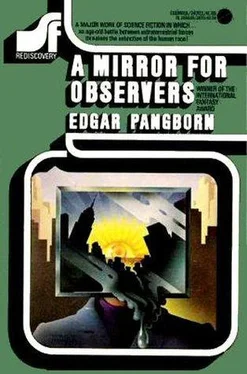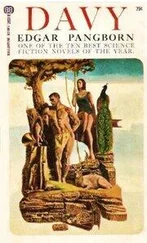“Angelo is alive, somewhere.”
“Faith,” she said gently. “But, Will darling, I just never have seen any of the mountains they say it moved. Well, you think if Angelo’s alive he might be in touch with — that fellow?”
“It’s possible.”
“I do remember Billy Kell, and a nasty piece of work he was, not that he ever actually did anything to me. He would grow up to be a Unity Party job, wouldn’t he! I’ve got to say it: what if you’re just breaking your heart over something that — I mean, it was so long ago! And none of it your fault anyway. Why, Ben — Will — the police must have looked, good and hard, it’s what they’re for and they have the means, they wouldn’t’ve let it drop. But you — look, if he’s — if he died, you probably wouldn’t ever even know it. Would you? Or maybe by this time he’s a bank teller or a physics professor or some ghastly thing, and you — I could shake you.”
“I’m old,” I said. “I have money. I could help him. Now that I know you’re a big girl, there’s nothing I want to do more.”
“Then I’ll eat my words. If it’s what you have to do….”
“It could mean a lot to you, if I find him. Couldn’t it?”
“Darling, to be filthily honest: how do I know?”
New York Thursday, March 9
Today and yesterday make an ending and a beginning. Drozma, I am nearly certain Angelo is alive. I’ll fill in some background.
Damn the Organic Unity Party, at least it doesn’t hide itself. It occupies the first floor of an office building that went up when Lexington was remodeled as one of the two-level avenues — the others are Second and Eighth, a triumph of the Gadget. Lower levels are only for cars equipped with electronic controls; no wheeled traffic on the upper levels except busses in narrow center lanes; overpasses for crosstown traffic.
My apartment is in a plush downtown development near the ghost of the Bowery. I started early this morning and walked above Second Avenue Upper Level for the fun of it. There is a game for the young on those airy overpasses: you can’t climb the guard fences, but through the mesh you can register an occasional hit on a bus top with wet chewing gum. I don’t know what scoring system is used.
I took a bus on Lexington Upper Level. Organic Unity Party headquarters is uptown near 125th. And Harlem is not as you remember, Drozma. Negroes live anywhere in town, or almost anywhere: still some plague spots of white supremacy, but these are dwindling and unimportant. Harlem is merely another part of town, with as many pale faces as dark. I didn’t find any dark faces at the Organic Unity offices…. Prosperous place. Saving the world for the pure in heart is profitable. Always was, I reckon.
The receptionist blonde had glassy perfection like a rhinestone. She assessed my good clothes, turned on welcome — Smile, Standard B-1; semiautomatic; Sugar Daddies, for the control of — and waved me through a frosted glass door labeled DANIEL WALKER. He’s a synthetically jolly endomorphic mesomorph softening with fat in his thirties. Just a greeter, one step up from the blonde. I took my time and got a cigar out of it. Nothing too blatant about Walker. His gaze is carefully candid; he speaks with the odd hollow noise of a man whose every word is a quotation. “I’m interested,” I said. “You don’t seem to be getting a good press.”
“You’re from a newspaper, Mr. Meisel?”
“No.” I looked shocked. “Retired. Used to be in real estate.”
“Never worry about the press,” he quoted. “Joe doesn’t. It’s all reactionary. Doesn’t Express the Organic Unity of the People.” He talked in capitals while I nodded and looked grim and wise. “In the Larger Sense, we do get a good press. They hate us, that makes talk, and talk brings us Intelligent Inquiries like your own.” I bridled: a durned old goat. “What interests you most about The Party, Mr. Meisel?”
“Your Sense of Purpose,” I said. “You’re not afraid of Stating an Aim.” I lit the cigar with a lighter that cost me forty-eight bucks — lingeringly, so that Mr. Walker’s candid eyes could price-tag it. (I’ll bring it home, Drozma. It has a pop-up white-gold nude half an inch high who whangs the flint with a hammer and kicks up behind. Aesthetic value about a nickel — the kids might enjoy it.)
“When you’re Alone in the World—” I sighed. “Frankly, Mr. Walker, I feel the Party might give me a Sense of Purpose of my own.” I told him the world was dangerously drifting. Internationalist delusions. Losing touch with the Eternal Verities. Skepticism rampant. Speaking as a skeptic myself, wonder if it could ramp? Think maybe it could.
“Yes indeed,” said Mr. Walker kindly, and pumped me for autobiography. I let it be dragged out that I was from Maine widower, no children. Used to be a Republican of course. Not now, by God. They were Reactionary: didn’t understand the inevitability of taking steps in Asia. No Sense of Purpose. I was good and cross about the Republicans.
“They’re on the way out,” Walker quoted. “Don’t give ’em a thought. Have you wondered why we call it the Organic Unity Party?” He didn’t wait to hear. “Here’s something confidential, Mr. Meisel. You notice the word ‘unity’ has one inconvenience. Can’t call ourselves Unionists or Unitarians — heh-heh. Nor Organists for that matter. The word, Mr. Meisel, is Organite. Something the Leader gave us only a few days ago, so it isn’t in the literature yet, but I’m sure you get the point. Soon it will be on everyone’s tongue. On the tongues of our enemies too, who will make fun of it.” He pointed ten manicured fingers at me. “Let them! We profit by that too.” That was the only moment when true masochistic fanaticism peeked from behind the mask of this soft athlete. “Now! Why Organic? Because it’s the only word that expresses the Nature of Society and the Basic Needs of Man! Society is a Unitary Organism. Now! What must any unitary organism have? Simple, isn’t it? Means of locomotion. Means of satisfying hunger, of reproducing. Sense organs. Certainly a unitary nervous system. Now! What, for instance, is Society’s means of satisfying hunger?” Under his busy hands, his desk leaked pamphlets and throwaways till my pockets were full.
“Agriculture and its workers,” I said, having seen some of the pamphlets and memorized the patter for these ideas, ideas so old and stale that human beings had begun to be hypnotized or repelled by them at least five thousand years ago.
“And what is the nervous system of Society?”
“Well naow, that right there, that bothers me some, frankly. Everybody wants to be part of the nervous system, seems as though.”
“No, friend, there you’re wrong — you don’t mind my saying it? Not everybody. The man in the street, Mr. Meisel, wants to be ruled. Don’t forget, Democracy must be defined as the greatest good for the greatest number. Ask yourself, sir, how many people know what’s good for ’em? The man in the street, Mr. Meisel, is in need of Enlightened Re-education. He must find, understand, and accept his appropriate place in the Organism. Or accept without understanding, sometimes. Now! Who’s to tell him? Who can, except an elite body of the well informed, the natural rulers, in other words the nervous system of Society?”
I attempted to look as if I’d just thought of something bright and shiny. “Seems as though that’s where the Organic Unity Party might come in.” I had let the cigar go out, so that the forty-eight dollar nude could flip her lid again. I puffed, looking so pleased with myself that I am still queasy at the memory. Walker was pleased too. Nor was I mistaken about the glimmer of contempt I saw in him, swiftly hidden as a weasel peeping over a rock pile.
Читать дальше












